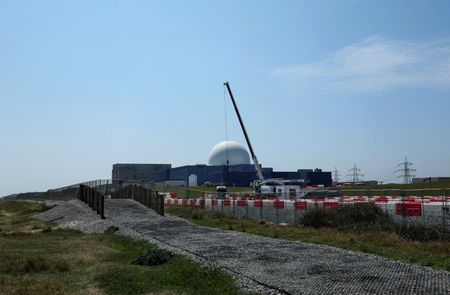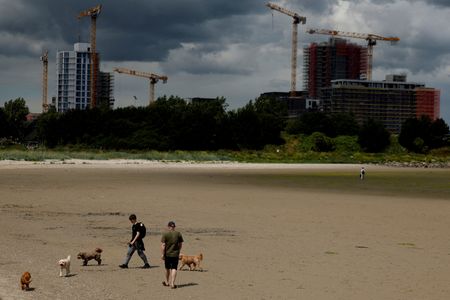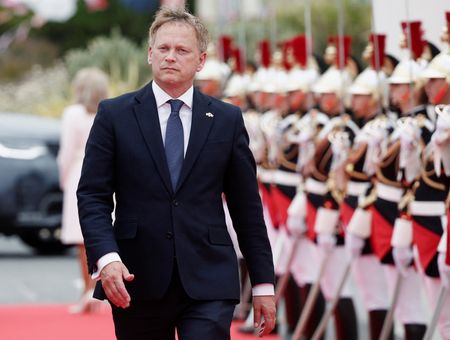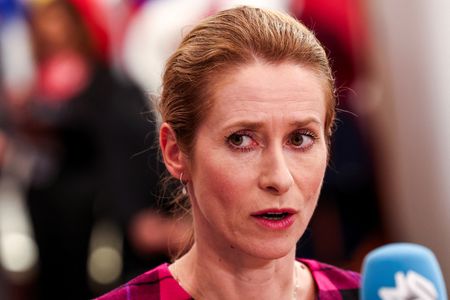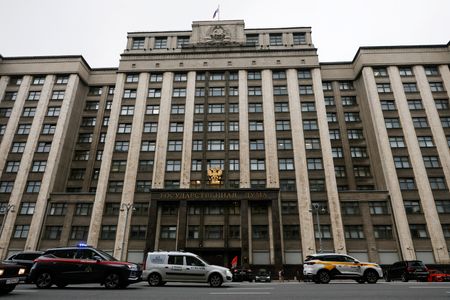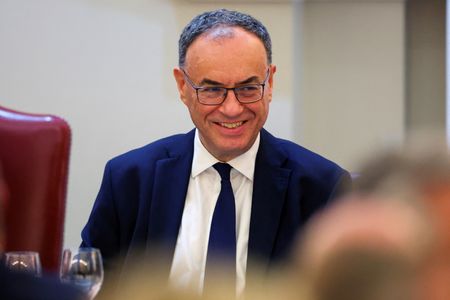By Sarah Young and Nina Chestney
LONDON (Reuters) -Britain has secured investment for the Sizewell C nuclear plant from Canadian pension fund La Caisse, Centrica and Amber Infrastructure, enabling the government to give the final go-ahead on Tuesday for the 38 billion pound ($51 billion) project.
Under the deal, the British state will be the largest shareholder in the project with a 44.9% stake, La Caisse will hold 20%, UK energy firm Centrica 15% and London-based Amber Infrastructure will take an initial 7.6%, joining France’s state-owned EDF which had already announced its 12.5% stake.
The decision to go ahead with Sizewell C in eastern England is another sign of a nuclear revival in Europe as several countries look to build new plants to replace ageing fleets, boost energy security and reach climate goals.
The plant in Suffolk will be only the second new nuclear plant built in Britain in more than two decades. It is expected to create around 10,000 jobs during the peak of construction, and produce enough electricity to power around 6 million homes when built.
EDF expects Sizewell C to be operational by around the mid to late 2030s.
“Delivering next generation, publicly-owned clean power is vital to our energy security and growth,” UK finance minister Rachel Reeves said in a statement.
FUNDING
Sizewell will use a funding regulated-asset-base (RAB) model where companies building new plants would be paid during the construction phase, cutting down their development risk and allowing them to secure cheaper financing.
The announcement of La Caisse as the second biggest shareholder comes as a surprise after months of speculation that Canadian investor Brookfield was in pole position to invest.
The government said Sizewell C will add around one pound a month to consumer bills over the duration of the construction. It also said the plant could reduce the cost of a low-carbon electricity system by around 2 billion pounds per year on average when operational.
Critics of the RAB model, which has also been used to fund London’s Thames Tideway Tunnel project, say it could leave taxpayers liable for any cost over-runs and delays during construction and add costs to energy bills at a time when many people are already struggling.
French state-owned EDF’s Hinkley Point C nuclear plant, currently under construction in Somerset, has been beset by delays and cost overruns, and is not due to start operating until about 2030.
EDF had initially said it would be powering British homes in 2017.
Sizewell C was first proposed in the early 2010s, when the plan was for it to be developed by EDF with China General Nuclear Power Group, but the UK government bought out the Chinese firm’s stake in 2022 amid security concerns.
The 38 billion pound total cost estimated by the government compared with initial estimates of a price tag of around 20 billion pounds.
France’s EDF has said it is investing around 1.1 billion pounds in Sizewell, while Centrica said in its statement it had committed to construction funding of 1.3 billion pounds.
The government statement said Britain’s National Wealth Fund would provide the majority of the debt finance for the project, alongside a debt guarantee from France’s export credit agency, Bpifrance Assurance Export.
($1 = 0.7424 pounds)
(Reporting by Sarah Young, Susanna Twidale and Nina Chestney; Editing by Kate Holton and Susan Fenton)

